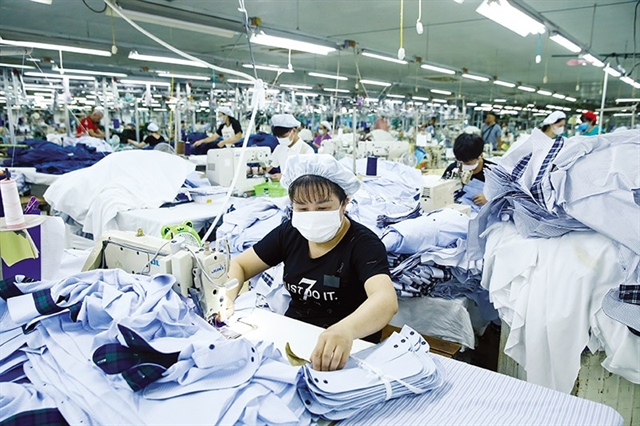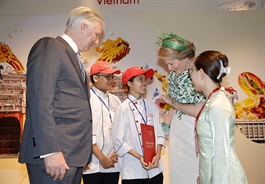Vietnam voices concern over new US textile tariff
Vietnam voices concern over new US textile tariff
Vietnam’s garment and textile industry enterprises are voicing growing concern over a newly announced 46 per cent US tariff, stressing that the industry plays a complementary–not competitive–role in the US market.

Vitas calls for review of US tariff as industry ‘not competing’ with American firms. Photo: Duc Thanh |
The announcement was the focal point of an emergency meeting on April 4 between Deputy Prime Minister Ho Duc Phoc and business representatives, including the Vietnam Textile and Apparel Association (Vitas).
Vitas vice chairman Truong Van Cam noted that Vietnam’s garment and textile industry exports to the US reached $16.6 billion in 2024, accounting for 38 per cent of the industry’s total export turnover, while imports from the US stood at just $1.2 billion, or 4.8 per cent of total raw material imports.
“The 46 per cent duty is a sudden and significant blow to the sector,” Cam said. “Our manufacturers already operate with slim margins in a highly competitive environment. A tariff this steep–far higher than those imposed on competitors–will push many businesses to the brink.”
The countervailing duties imposed on Vietnam are markedly higher than those on other textile exporters. China faces a 34 per cent duty despite holding 24.62 per cent of the US import market. India is subject to a 26 per cent duty (8.87 per cent share), Bangladesh 37 per cent (6.73 per cent), Indonesia 32 per cent (4.39 per cent), and Mexico 25 per cent (3.85 per cent). Other exporters such as Cambodia, Pakistan, Honduras, and Turkey face rates ranging from 10 to 49 per cent.
Cam emphasised that Vietnamese textiles do not threaten US domestic industry but have gradually gained market share from China. From 2019 to 2024, China’s share of US textile imports declined from 32.8 per cent to 24.62 per cent.
“Our exports support jobs in Vietnam and provide American consumers with quality goods at competitive prices,” he added. “This high tariff discourages foreign investment in Vietnam’s textile value chain–particularly in fabric production and dyeing, which are essential for meeting rules of origin under FTAs.”
In response to the new measures, Vitas has urged businesses to diversify export markets, especially to FTA-partner countries. Companies are encouraged to renegotiate orders and collaborate with global brands to share the burden of additional duties. Enhancing transparency and traceability across supply chains was also highlighted as a priority.
Vitas called on the government to work with the US to revise the tariff—potentially adjusting it by product category–and to address the broader trade imbalance. It also recommended accelerating negotiations on high-potential FTAs.
Cam appealed to the US Embassy in Hanoi to delay enforcement of the duty by two to three months, giving both sides time to negotiate and adjust policy.
On the evening of April 4, General Secretary To Lam held a phone call with US President Donald Trump to address the issue directly. Lam reiterated Vietnam’s readiness to eliminate tariffs on US goods and called for reciprocal treatment from Washington.
He urged continued facilitation of US exports to Vietnam and encouraged further American investment. Both leaders agreed to initiate talks towards a bilateral agreement aimed at strengthening trade ties.
- 10:06 07/04/2025



























